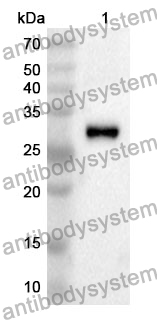Catalog No.
PMK97101
Species reactivity
Mouse
Host species
Rabbit
Isotype
IgG
Clonality
Polyclonal
Immunogen
E. coli - derived recombinant Mouse ST14 (Ser213-Ser449).
Tested applications
ELISA: 1:4000-1:8000, IHC: 1:50-1:100, WB: 1:1000-1:4000
Target
Suppressor of tumorigenicity 14 protein homolog (EC 3.4.21.109) (Epithin) (Serine protease 14)
Purification
Purified by antigen affinity column.
Accession
P56677
Applications
ELISA, IHC, WB
Form
Liquid
Storage buffer
0.01M PBS, pH 7.4, 50% Glycerol, 0.05% Proclin 300.
Stability and Storage
Use a manual defrost freezer and avoid repeated freeze thaw cycles. Store at 2 to 8°C for frequent use. Store at -20 to -80°C for twelve months from the date of receipt.
A study on viruses and bacteria with particular interest on Mycoplasma pneumoniae in children with exacerbation of asthma from a tertiary care hospital in Sri Lanka., PMID:39081780
MCAM+ brain endothelial cells contribute to neuroinflammation by recruiting pathogenic CD4+ T lymphocytes., PMID:36319587
Sequential Linkage of Carbohydrate Antigens to Mimic Capsular Polysaccharides: Toward Semisynthetic Glycoconjugate Vaccine Candidates against Streptococcus pneumoniae Serotype 14., PMID:32835479
Intramembrane proteolysis of an extracellular serine protease, epithin/PRSS14, enables its intracellular nuclear function., PMID:32493324
Targeting metastatic breast cancer with peptide epitopes derived from autocatalytic loop of Prss14/ST14 membrane serine protease and with monoclonal antibodies., PMID:31426843
Tissue distribution and subcellular localizations determine in vivo functional relationship among prostasin, matriptase, HAI-1, and HAI-2 in human skin., PMID:29438412
Matriptase Induction of Metalloproteinase-Dependent Aggrecanolysis In Vitro and In Vivo: Promotion of Osteoarthritic Cartilage Damage by Multiple Mechanisms., PMID:28464560
Ibuprofen regulates the expression and function of membrane-associated serine proteases prostasin and matriptase., PMID:26715240
Capsular Polysaccharide (CPS) Release by Serotype 3 Pneumococcal Strains Reduces the Protective Effect of Anti-Type 3 CPS Antibodies., PMID:26677201
Differential subcellular localization renders HAI-2 a matriptase inhibitor in breast cancer cells but not in mammary epithelial cells., PMID:25786220
Proteases as activators for cytotoxic prodrugs in antitumor therapy., PMID:24709544
The differential impact of coadministered vaccines, geographic region, vaccine product and other covariates on pneumococcal conjugate vaccine immunogenicity., PMID:24336055
Overexpression of matriptase correlates with poor prognosis in esophageal squamous cell carcinoma., PMID:24248283
Activity and inhibition of prostasin and matriptase on apical and basolateral surfaces of human airway epithelial cells., PMID:22582115
Soluble epithin/PRSS14 secreted from cancer cells contains active angiogenic potential., PMID:20652801
Tumor detection by imaging proteolytic activity., PMID:20145119
Improving the species cross-reactivity of an antibody using computational design., PMID:19477127
Coordinate expression and functional profiling identify an extracellular proteolytic signaling pathway., PMID:17389401
Autoactivation of matriptase in vitro: requirement for biomembrane and LDL receptor domain., PMID:17344310
The cytotrophoblast layer of human chorionic villi becomes thinner but maintains its structural integrity during gestation., PMID:17035639
Protein interaction analysis of ST14 domains and their point and deletion mutants., PMID:16407223
Tissue microarray analysis of hepatocyte growth factor/Met pathway components reveals a role for Met, matriptase, and hepatocyte growth factor activator inhibitor 1 in the progression of node-negative breast cancer., PMID:12615728
Regulation of the activity of matriptase on epithelial cell surfaces by a blood-derived factor., PMID:11231297
Yeast artificial chromosomes with 200- to 800-kilobase inserts of human DNA containing HLA, V kappa, 5S, and Xq24-Xq28 sequences., PMID:2537978
Peptide immunocytochemistry in afferent neurons from lower gut in rats., PMID:3067223


